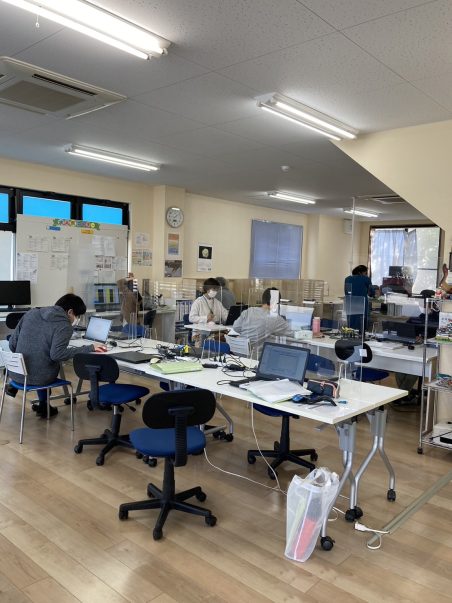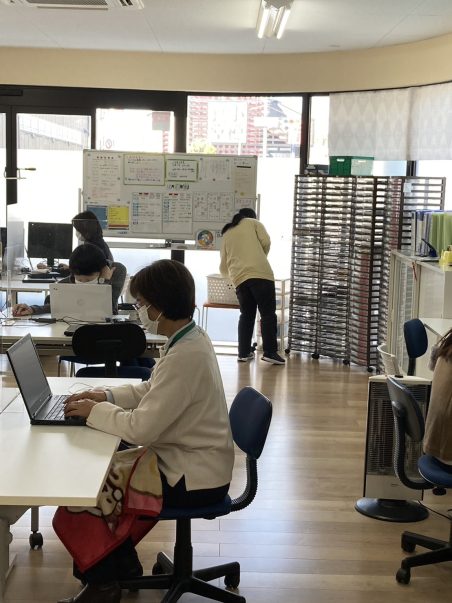Asking an NPO About Employment Support for People with Disabilities InsightsEssays: Civil Society in Japan
Posted on July 21, 2023
Japan NPO Center (JNPOC) has a news & commentary site called NPO CROSS that discusses the role of NPOs/NGOs and civil society as well as social issues in Japan and abroad. We post articles contributed by various stakeholders, including NPOs, foundations, corporations, and volunteer writers.
For this JNPOC’s English site, we select some translated articles from NPO CROSS to introduce to our English-speaking readers.
Asking an NPO about employment support for people with disabilities
 Mr. Shuichi Kojima
Mr. Shuichi Kojima
“Work itself is not our goal. We want to help people with disabilities and those having a hard life to be able to continue working,” says Mr. Shuichi Kojima. He is the President of Nara Support Work Labo (hereafter Work Labo), a nonprofit organization in Nara Prefecture that provides welfare services for people with disabilities, including employment transition assistance, based on the Japanese law (Act on Providing Comprehensive Support for the Daily Life and Life in Society of Persons with Disabilities). Mr. Kojima has been involved in employment support for disabled people for about 40 years.
I—the author of this article—became ill and suffered from an adjustment disorder after I graduated and got a job. Even after improvement, I had bipolar disorder with severe mood swings and also experienced an adjustment disorder for the second time. Later, I attended an employment transition support facility where I learned IT skills through video learning for six months, and last year I found a job at a special subsidiary (which is often established by large companies to meet the statutory employment ratio of persons with disabilities set by the government). I continue to be in close contact with employment support facility staff, who still help me control my physical condition on a daily basis.
Through this interview opportunity, I wanted to ask the staff at other employment support facilities what they think daily about how they relate to the facility users and what they think about the future of employment for people with disabilities.
Employment transition support and Work Labo’s work
 In the training room
In the training room
The government’s employment transition support is a comprehensive program that supports people with disabilities to acquire the knowledge and skills necessary for regular (non-welfare) employment and to find a job. Work Labo provides three services: 1. Rehabilitation Services (daily life training), 2. Employment Transition Support, and 3. Employment Retention Support, with employment transition support positioned as their core service.
Rehabilitation Services are often used when employment is unlikely to be attained for someone within the two-year timeframe of the employment transition support program. For example, when supporting a person who has been a shut-in (or hikikomori), they may start with daily life training once or twice a week. They move on to an Employment Transition Support program when their condition has settled down, and they are ready to prepare for employment. They would first set the goal to “get out of the house,” and have them gradually challenge what else they can do, rather than focusing on what they cannot do.
The Employment Transition Support program provides “training and experience for employment” and “job search support and matching.” While some facilities provide stipends, Work Labo’s training and work experience are not focused on wages, but on preparing the participants with programs within their facility to build the skills that can help them continue working and have them fully consider what jobs would suit them first, before connecting them to real work experiences outside.
 A course for employment transition support
A course for employment transition support
Work Labo follows up with them for the first half year of employment; if their users still need ongoing consultation and support, it asks them to use Employment Retention Support to ensure that they can find stable employment. For the rest of the users, Work Labo simply tells them to come back for consultation anytime if they need anything so that they continue to be connected.
In this way, Work Labo consistently attends to users as long as they need to, from daily life to starting employment to job retention. Work Labo has no plans to increase the number of offices, and staff turnover is minimal. The reason for this is to make sure that when the users visit Work Labo after they have finished utilizing their services, they still have staff whom they know. Work Labo is determined to be a place where users can come back anytime, even after their period of use is over.
What Work Labo cares about in its operation
 Doing sorting work
Doing sorting work
Mr. Kojima considers employment transition support as a place to prepare for continued work.
He strives to help the users find a job after they are ready to work and to ensure stable employment once they are employed. In the three years since October 2019, 30 users have found employment, and their six-month retention rate in the workplace is indeed 100%. However, Mr. Kojima is also open to suggesting that a worker leave his or her job if he or she feels it is necessary due to the unfit work environment or their health condition. To him, the person is always the priority.
In the future, through training and workshops, he would like to focus on increasing opportunities for companies to learn about the employment of people with disabilities. This is not because employment of the disabled is mandatory for the companies, but because he wants to build a win-win relationship in which disabled people can work and earn a living, and companies can benefit from it as well. Since many disabled people who fail to find jobs after graduating from high school end up withdrawing from society, Work Labo is also planning to reach out to schools through the Board of Education and hold meetings with interested teachers to exchange ideas on how to encourage schools and to create a flow from school to employment support before the students become withdrawn.
Thoughts after the interview
I was impressed by Work Labo’s commitment to being close to its users and the fact that they are thoroughly considering what it can do to help people with life difficulties so that they can continue working for a long time. In addition to approaching users, Mr. Kojima tries to collaborate with companies and schools, focusing on stable employment for people with disabilities from multiple angles. As I am still receiving support from an employment transition assistance facility myself, I felt Mr. Kojima cares deeply about Work Labo and its aspiration to be a place to which people with disabilities can always come back. It is reassuring to disabled people that the supporters care so much about the users, and I strongly believe that no one compares when it comes to Mr. Kojima’s willingness to be so close to the users. And I hope this article can be of some help to those who are experiencing difficulties in life.
Original text by Ikumu Onuma (JNPOC’s volunteer writer) originally posted on March 24, 2023; translated by JNPOC.
Recent Articles
- Shared solutions, stronger communities: Social economy and social innovation in Europe and Japan
- NPO support for disaster victims: Key discussion points
- Beyond support: Fostering genuine dialogues
- Reconsidering the significance of public comments
- Towards a society where children want to embrace life
- The Evolution of Philanthropy: Five approaches shaping contemporary practice